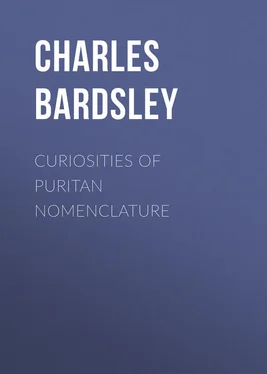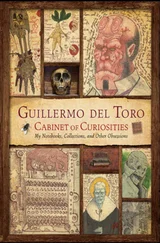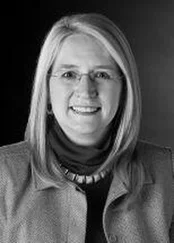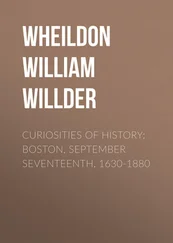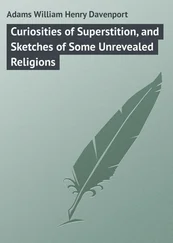Charles Bardsley - Curiosities of Puritan Nomenclature
Здесь есть возможность читать онлайн «Charles Bardsley - Curiosities of Puritan Nomenclature» — ознакомительный отрывок электронной книги совершенно бесплатно, а после прочтения отрывка купить полную версию. В некоторых случаях можно слушать аудио, скачать через торрент в формате fb2 и присутствует краткое содержание. ISBN: , Жанр: foreign_antique, foreign_prose, на английском языке. Описание произведения, (предисловие) а так же отзывы посетителей доступны на портале библиотеки ЛибКат.
- Название:Curiosities of Puritan Nomenclature
- Автор:
- Жанр:
- Год:неизвестен
- ISBN:http://www.gutenberg.org/ebooks/39284
- Рейтинг книги:3 / 5. Голосов: 1
-
Избранное:Добавить в избранное
- Отзывы:
-
Ваша оценка:
- 60
- 1
- 2
- 3
- 4
- 5
Curiosities of Puritan Nomenclature: краткое содержание, описание и аннотация
Предлагаем к чтению аннотацию, описание, краткое содержание или предисловие (зависит от того, что написал сам автор книги «Curiosities of Puritan Nomenclature»). Если вы не нашли необходимую информацию о книге — напишите в комментариях, мы постараемся отыскать её.
Curiosities of Puritan Nomenclature — читать онлайн ознакомительный отрывок
Ниже представлен текст книги, разбитый по страницам. Система сохранения места последней прочитанной страницы, позволяет с удобством читать онлайн бесплатно книгу «Curiosities of Puritan Nomenclature», без необходимости каждый раз заново искать на чём Вы остановились. Поставьте закладку, и сможете в любой момент перейти на страницу, на которой закончили чтение.
Интервал:
Закладка:
Curiosities of Puritan Nomenclature
PREFACE
I will not be so ill-natured as to quote the names of all the writers who have denied the existence of Puritan eccentricities at the font. One, at least, ought to have known better, for he has edited more books of the Puritan epoch than any other man in England. The mistake of all is that, misled perhaps by Walter Scott and Macaulay, they have looked solely to the Commonwealth period. The custom was then in its decay.
I have to thank several clergymen for giving me extracts from the registers and records under their care. A stranger to them, I felt some diffidence in making my requests. In every case the assistance I asked for was readily extended. These gentlemen are the Rev. W. Sparrow Simpson, St. Matthew, Friday Street, London; the Rev. W. Wodehouse, Elham, Canterbury; the Rev. J. B. Waytes, Markington, Yorks.; the Rev. William Tebbs, Caterham Valley; the Rev. Canon Howell, Drayton, Norwich; the Rev. J. O. Lord, Northiam, Staplehurst; and the Rev. G. E. Haviland, Warbleton, Sussex. The last-named gentleman copied no less than 120 names, all of Puritan origin, from the Warbleton records. I beg to thank him most warmly, and to congratulate him on possessing the most remarkable register of its kind in England. Certain circumstances led me to suspect that Warbleton was a kind of head-quarters of these eccentricities; I wrote to the rector, and we soon found that we had “struck ile.” That Mr. Heley, the Puritan incumbent, should have baptized his own children by such names as Fear-not and Much-mercy, was not strange, but that he should have persuaded the majority of his parishioners to follow his example proves wonderful personal influence.
Amongst the laity, I owe gratitude to Mr. Chaloner Smith, Richmond, Surrey; Mr. R. R. Lloyd, St. Albans; Mr. J. E. Bailey, F.S.A., Manchester; Mr. J. L. Beardsley, Cleveland, U.S.A.; Mr. Tarbutts, Cranbrook, Kent; and Mr. Speed, Ulverston.
Of publications, I must needs mention Notes and Queries , a treasure-house to all antiquaries; the Sussex Archæological Society’s works, and the Yorkshire Archæological and Topographical Journal . The “Wappentagium de Strafford” of the latter is the best document yet published for students of nomenclature. Out of it alone a complete history of English surnames and baptismal names might be written. Though inscribed with clerkly formality, it contained more pet forms than any other record I have yet seen; and this alone must stamp it as a most important document. The Harleian Society, by publishing church registers, have set a good example, and I have made much use of those that have been issued. They contain few instances of Puritan extravagance, but that is owing to the fact that no leading Puritan was minister of any of the three churches whose records they have so far printed. I sincerely hope the list of subscribers to this society may become enlarged.
For the rest – the result of twelve years’ research – I am alone responsible. Heavy clerical responsibilities have often been lightened by a holiday spent among the yellow parchments of churches in town and country, from north to south of England. As it is possible I have seen as many registers as any other man in the country, I will add one statement – a very serious one: there are thousands of entries, at this moment faintly legible, which in another generation will be wholly illegible. What is to be done?
Should this little work meet the eye of any of the clergy in Sussex, Kent, and, I may add, Surrey, I would like to state that if they will search the baptismal records of the churches under their charge, say from 1580 to 1620, and furnish me with the result, I shall be very much obliged.
Vicarage, Ulverston,
March, 1880 .
NOTE
PROLOGUE.
THE PET-NAME EPOCH IN ENGLAND
“One grows too fat, another too lean: modest Matilda, pretty pleasing Peg, sweet-singing Susan, mincing merry Moll, dainty dancing Doll, neat Nancy, jolly Joan, nimble Nell, kissing Kate, bouncing Bess with black eyes, fair Phillis with fine white hands, fiddling Frank, tall Tib, slender Sib, will quickly lose their grace, grow fulsome, stale, sad, heavy, dull, sour, and all at last out of fashion.” — Anatomy of Melancholy.
“Be the jacks fair within, the jills fair without, the carpets laid, and everything in order?” — The Taming of the Shrew.
There were no Scripture names in England when the Conqueror took possession; even in Normandy they had appeared but a generation or two before William came over. If any are found in the old English period, we may feel assured they were ecclesiastic titles, adopted at ordination. Greek and Latin saints were equally unnoticed.
It is hard to believe the statement I have made. Before many generations had passed, Bartholomew, Simon, Peter, Philip, Thomas, Nicholas, John, and Elias, had engrossed a third of the male population; yet Domesday Book has no Philip, no Thomas, only one Nicholas, and but a sprinkling of Johns. It was not long before Jack and Jill took the place of Godric and Godgivu as representative of the English sexes, yet Jack was from the Bible, and Jill from the saintly Calendar.
Without entering into a deep discussion, we may say that the great mass of the old English names had gone down before the year 1200 had been reached. Those that survived only held on for bare existence. From the moment of William’s advent, the names of the Norman began to prevail. He brought in Bible names, Saint names, and his own Teutonic names. The old English names bowed to them, and disappeared.
A curious result followed. From the year 1150 to 1550, four hundred years in round numbers, there was a very much smaller dictionary of English personal names than there had been for four hundred years before, and than there has been in the four hundred years since. The Norman list was really a small one, and yet it took possession of the whole of England.
A consequence of this was the Pet-name Epoch. In every community of one hundred Englishmen about the year 1300, there would be an average of twenty Johns and fifteen Williams; then would follow Thomas, Bartholomew, Nicholas, Philip, Simon, Peter, and Isaac from the Scriptures, and Richard, Robert, Walter, Henry, Guy, Roger, and Baldwin from the Teutonic list. Of female names, Matilda, Isabella, and Emma were first favourites, and Cecilia, Catharine, Margaret, and Gillian came closely upon their heels. Behind these, again, followed a fairly familiar number of names of either sex, some from the Teuton, some from the Hebrew, some from the Greek and Latin Church, but, when all told, not a large category.
It was, of course, impossible for Englishmen and Englishwomen to maintain their individuality on these terms. Various methods to secure a personality arose. The surname was adopted, and there were John Atte-wood, John the Wheelwright, John the Bigg, and John Richard’s son, in every community. Among the middle and lower classes these did not become hereditary till so late as 1450 or 1500. 1 1 This is easily proved. In the wardrobe accounts for Edward IV., 1480, occur the following items: — “John Poyntmaker, for pointing of xl. dozen points of silk pointed with agelettes of laton. “John Carter, for cariage away of a grete loode of robeux that was left in the strete. “To a laborer called Rychard Gardyner working in the gardyne. “To Alice Shapster for making and washing of xxiiii. sherts, and xxiiii. stomachers.” Shapster is a feminine form of Shapper or Shaper – one who shaped or cut out cloths for garments. All these several individuals, having no particular surname, took or received one from the occupation they temporarily followed. – “Privy Purse Expenses, Eliz. of York,” p. 122.
This was not enough, for in common parlance it was not likely the full name would be used. Besides, there might be two, or even three, Johns in the same family. So late as March, 1545, the will of John Parnell de Gyrton runs:
Интервал:
Закладка:
Похожие книги на «Curiosities of Puritan Nomenclature»
Представляем Вашему вниманию похожие книги на «Curiosities of Puritan Nomenclature» списком для выбора. Мы отобрали схожую по названию и смыслу литературу в надежде предоставить читателям больше вариантов отыскать новые, интересные, ещё непрочитанные произведения.
Обсуждение, отзывы о книге «Curiosities of Puritan Nomenclature» и просто собственные мнения читателей. Оставьте ваши комментарии, напишите, что Вы думаете о произведении, его смысле или главных героях. Укажите что конкретно понравилось, а что нет, и почему Вы так считаете.
